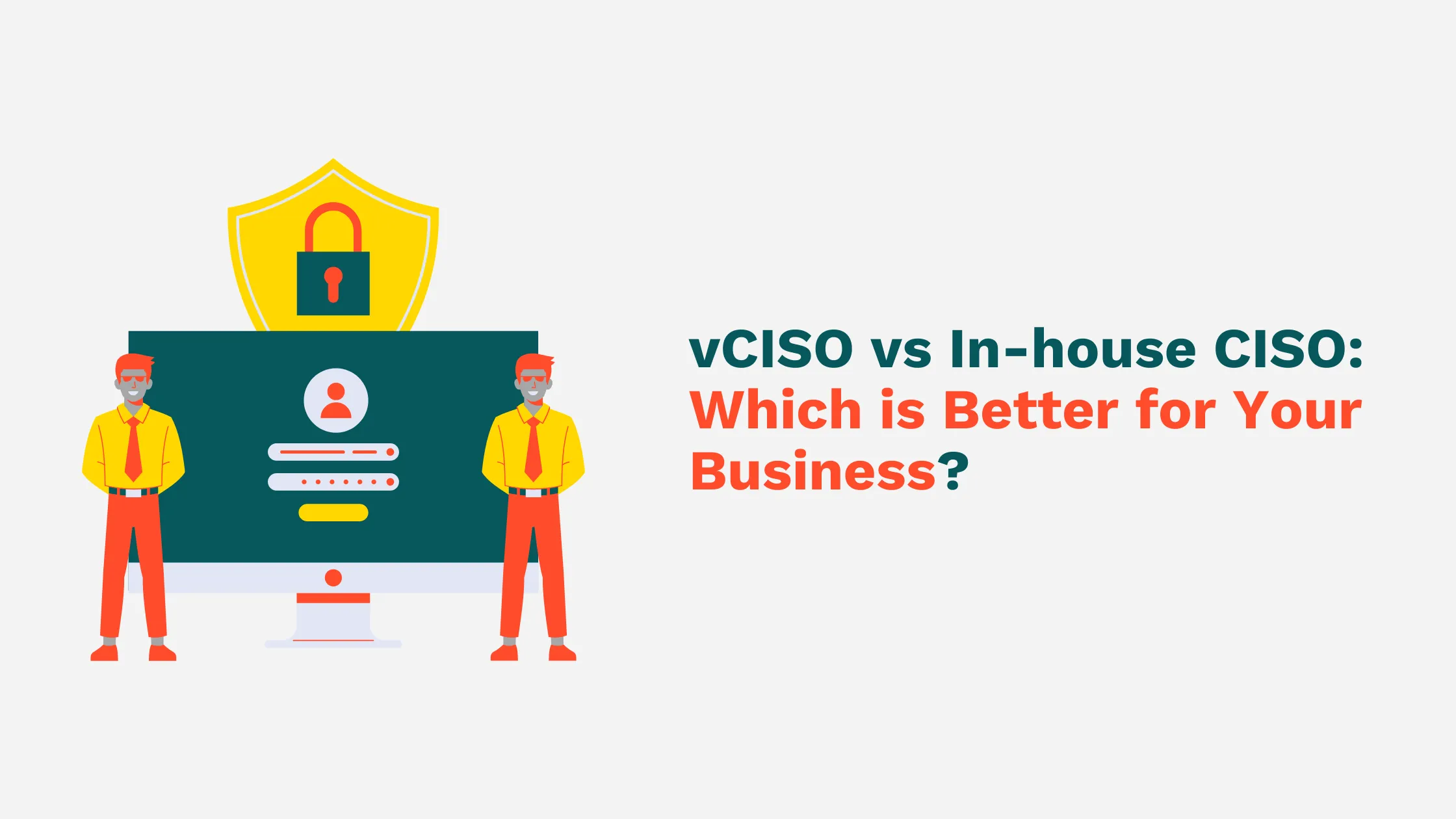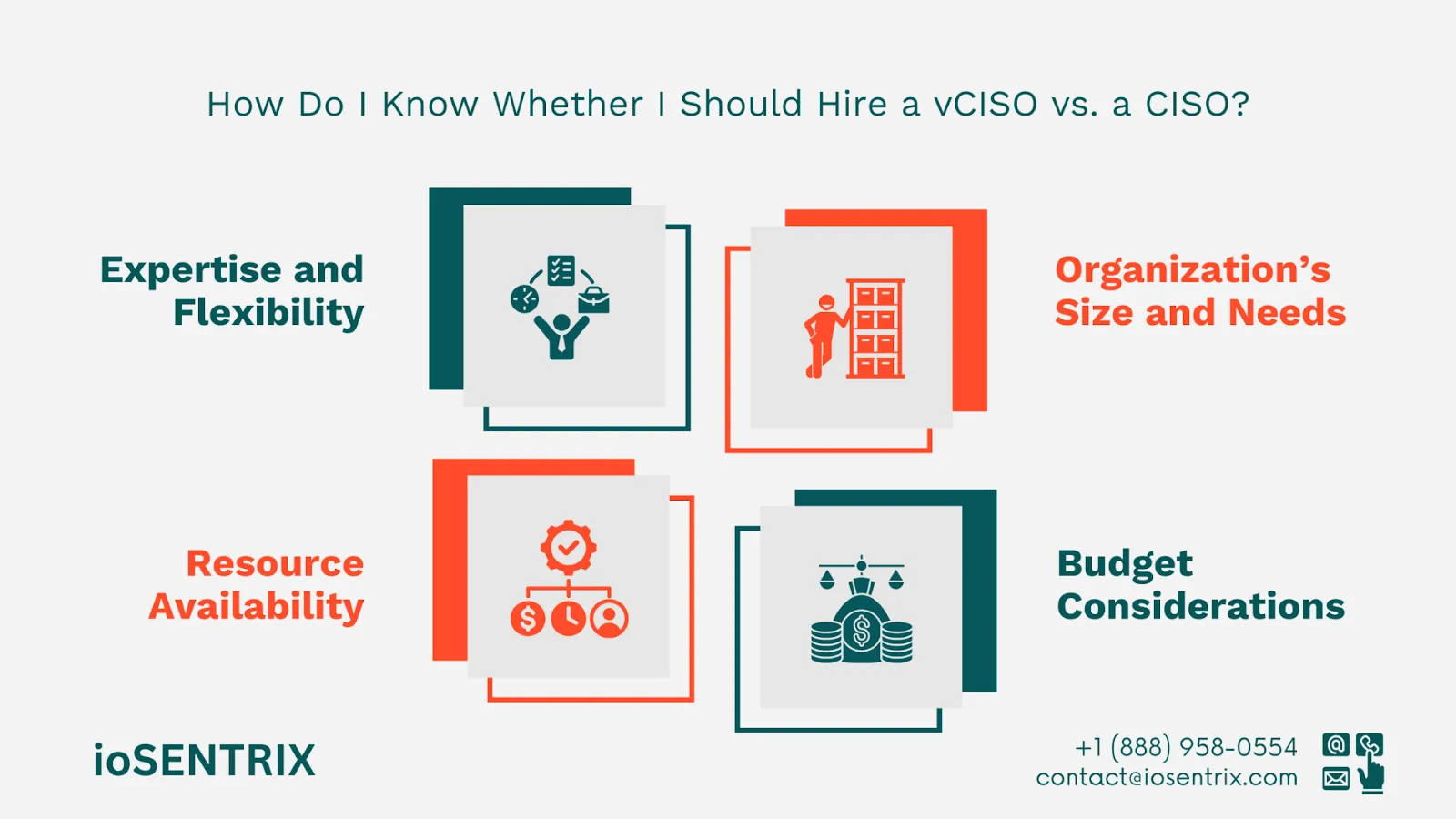
When it comes to protecting your organization's information, two key roles play a crucial part: the Chief Information Security Officer (CISO) and the virtual Chief Information Security Officer (vCISO). While both positions are essential for protection against cyber attacks, they have different approaches, responsibilities, and ways of working.
Companies face a tough decision between hiring a traditional CISO and a vCISO. This blog explores the main differences between vCISO and CISO to help you decide on your organization's information security needs.
A CISO is a full-time employee responsible for protecting the organization’s information assets. This role involves:
An in-house CISO provides valuable expertise to strengthen an organization's security posture. He works closely with executive management to ensure security efforts align with the organization's overall goals and objectives.
In larger organizations, a CISO typically plays a key leadership role. He helps shape the overall security strategy and ensures it is well-implemented and compliant with relevant regulations.
Chief Information Security Officers (CISOs) offer expert leadership in cybersecurity. They ensure security plans align with the company's goals and, because they work full-time, can create detailed and custom security strategies and programs.
A dedicated CISO means the organization always has a leader available to handle crises and manage security efforts. This allows the company to constantly monitor risks, that may arise, and respond quickly.
CISOs frequently work with limited budgets, which can affect their ability to implement effective and comprehensive security measures. This challenge is particularly significant in large organizations with complicated IT setups.
Additionally, the field of cybersecurity changes quickly, with new threats appearing constantly. To maintain strong defense strategies, CISOs must keep up with these changes, which involves ongoing learning and adapting to new security challenges.
A virtual CISO (vCISO) is a part-time or on-demand security expert who provides strategic guidance and leadership to organizations. This model is ideal for mid-sized businesses and small enterprises that need access to high-level cybersecurity expertise but cannot afford a full-time employee.
Virtual CISOs bring a wealth of experience, having worked with multiple clients across various industries. This helps organizations tap into their expertise without the cost and commitment of a full-time staff member.
A virtual CISO (vCISO) provides expert cybersecurity guidance without hiring a full-time CISO. This makes it a good choice for small and medium-sized businesses.
A vCISO offers businesses flexibility when choosing short-term projects or long-term partnerships. This adaptability helps companies adjust their cybersecurity plans as their needs change and new threats emerge.
Many vCISOs have experience in different industries, giving them a broad view of security challenges. This diverse knowledge helps organizations adopt the best security practices from various fields.
Because vCISOs are external consultants, it can be difficult to integrate their cybersecurity plans into a company's current way of doing things. This can cause reluctance or delays in putting recommended changes into action.
Also, as outsiders, vCISOs may have less power to influence internal decisions. This can limit their ability to implement changes effectively, particularly in organisations that do not prioritize security.
It depends on various factors such as:
Big companies with many digital resources and complicated security requirements might be better off with a full-time CISO. On the other hand, smaller organizations or those just starting to develop their cybersecurity plan may find a vCISO a more valuable and affordable option.
Full-time CISOs can be costly, especially for SMBs. However, vCISOs offer a more affordable solution by providing services at an hourly rate or through customized security plans. These flexible options can help reduce financial pressures and make cybersecurity more accessible to businesses of all sizes.

In-house CISOs know the company culture and its specific security problems very well. However, vCISOs offer broader cybersecurity experience and insight into various threat environments.
VCISOs can give helpful advice and lead strategically. They adapt fast to new threats and ensure the company follows cybersecurity rules.
Companies that already have good security teams may want to consult a vCISO for extra advice on strategy and risk management.
Companies that don't have enough security staff might gain more from a traditional CISO. This is because a CISO gives complete oversight from an executive level.
At ioSENTRIX`, we provide customized vCISO services to meet the specific needs of our clients.
Our virtual CISOs offer expertise in security, including strategic advice, risk checking, creating security policies, and training employees on security awareness.
Whether you're a growing small business, a small or medium-sized enterprise, or a larger organization looking to improve your cybersecurity, our virtual CISO services help you stay safe from threats and follow industry rules.
Contact us now for more information.
The vCIO is responsible for making sure technology aligns with business goals. At the same time, the vCISO ensures that these technological solutions are safe, meet compliance standards, and are ready to satisfy the strict demands of cybersecurity frameworks.
vCISOs work to develop and put into place security policies, procedures, and employee awareness programs that match your organization's goals and values. This helps every team member understand how to contribute to a secure work environment.
The CISO position is not just about technical knowledge. While a CISO should have a good understanding of technology, strong leadership, and strategic thinking are more important for success in this role than being an expert in all areas of cybersecurity.